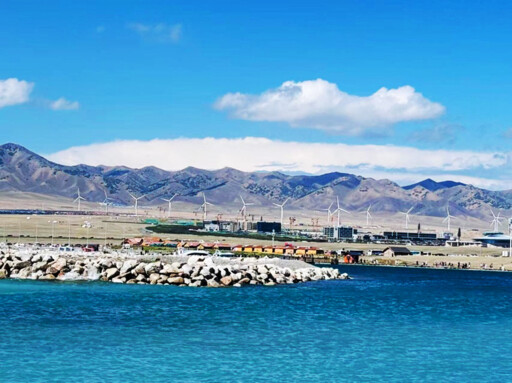


‘Dual carbon’ goals draw roadmap for green development

Wind turbines spin along the shores of the Sayram Lake in Xinjiang Uygur Autonomous Region. Photo: Chen Mirong/CSST
The fifth anniversary of the “dual carbon” goals offers a timely opportunity to gain deeper insight into the internal logic of Xi Jinping Thought on Eco-Civilization and to better understand its practical strength and global contribution. This understanding is essential for advancing the comprehensive green transformation of China’s economic and social development, promoting reform of the global climate governance system, and pursuing modernization of harmony between humanity and nature.
Reflecting inherent requirements of Xi Jinping Thought on Eco-Civilization
The “dual carbon” goals embody the inherent requirements of the new development philosophy and serve as a key instrument for implementing Xi Jinping Thought on Eco-Civilization. It is therefore necessary to accurately grasp their intrinsic unity with this guiding thought.
First, theoretical innovation and strategic direction are unified. Xi Jinping Thought on Eco-Civilization stresses that “lucid waters and lush mountains are invaluable assets,” advocates respect for, adaptation to, and protection of nature, and emphasizes harmony between humanity and nature. This philosophy redefines the relationships between humans and nature and between development and conservation at a fundamental level. The “dual carbon” goals are not simply technical targets but rather a strategic extension and concrete expression of this theoretical framework in terms of development stages, models, and pathways. Rooted in a profound understanding of the laws of development within Xi Jinping Thought on Eco-Civilization, they provide clear strategic direction and binding targets to address pressing resource and environmental constraints while advancing sustainable development. By translating the thought into tangible pathways of action, and by testing and refining these pathways through practice, the “dual carbon” goals continually enrich and expand the theoretical depth of Xi Jinping Thought on Eco-Civilization, laying a solid theoretical foundation for Chinese modernization featuring harmony between humanity and nature.
Second, they embody the unity of a systemic mindset and comprehensive transformation. Achieving carbon peaking and carbon neutrality is by no means a simple environmental task; it entails comprehensive transition and upgrade spanning energy structures, industrial models, technological capabilities, consumption patterns, spatial layouts, and governance systems. It also requires integrating green and low-carbon principles into every dimension of economic and social development. This systemic transition aligns seamlessly with the holistic view emphasized by Xi Jinping Thought on Eco-Civilization, which calls for coordinated protection and governance of mountains, rivers, forests, farmlands, lakes, grasslands, and deserts.
Third, they unify national resolve and global responsibility. Xi Jinping Thought on Eco-Civilization embodies the long-term vision of ensuring the enduring, sustainable development of the Chinese nation and building a shared future for all life on Earth and for humanity. The “dual carbon” goals reflect China’s phased objectives based on its national conditions and developmental stage, while also demonstrating the responsibility of a major country actively participating in and leading global environmental governance. They signify China’s decisive shift toward a new paradigm of innovation-driven, green, and low-carbon development, injecting strong momentum into the global response to climate change and green economic growth.
Demonstrating China’s responsibility as major country
The “dual carbon” goals underscore China’s firm resolve to address climate change and reshape the role and responsibilities of developing countries in the global climate agenda. By injecting certainty into global climate governance, China has significantly enhanced the inclusiveness and effectiveness of the global climate governance system, contributing to the establishment of a new climate governance order.
First, it has substantially boosted global confidence and determination in tackling climate change. As the world’s largest developing country, China’s proposal and steady progress toward carbon peaking and carbon neutrality have effectively mitigated risks of backsliding and institutional fragmentation within the global climate governance process. Its solemn commitments and concrete green practices have not only bolstered international confidence in collective action but have also offered developing nations a new alternative to the Western modernization model by demonstrating a viable pathway for synergizing economic growth with low-carbon transition.
Second, China is leading the global ecological civilization agenda through pragmatic action. By integrating the “dual carbon” goals into its strategy for ecological civilization and overall national modernization drive, China demonstrates its deep commitment to sustainable development and global ecological security. Amid rising sentiments against globalization and fragmented momentum for climate governance, China’s systematic emission reduction pathways and industrial transformation showcase its steadfast support for multilateralism and the provision of global public goods.
Third, China empowers the global green transition through market scale and technological capacity. Its vast clean energy market and comprehensive green industrial chain have significantly reduced the costs of scaling up low-carbon technologies such as renewable energy, energy storage, and electric vehicles. Through energy cooperation under the Belt and Road Initiative and South-South climate assistance, China actively promotes the application of practical green technologies in developing countries. These efforts help ease the tension between their development aspirations and emissions reduction requirements, providing essential material support and institutional guarantees for building a fair, reasonable, and cooperative global climate governance system.
Huang Chengliang is secretary-general of the Research Center for Xi Jinping Thought on Eco-Civilization at the Chinese Academy of Social Sciences (CASS) and a research fellow from the Research Institute for Eco-Civilization at CASS.
Editor:Yu Hui
Copyright©2023 CSSN All Rights Reserved